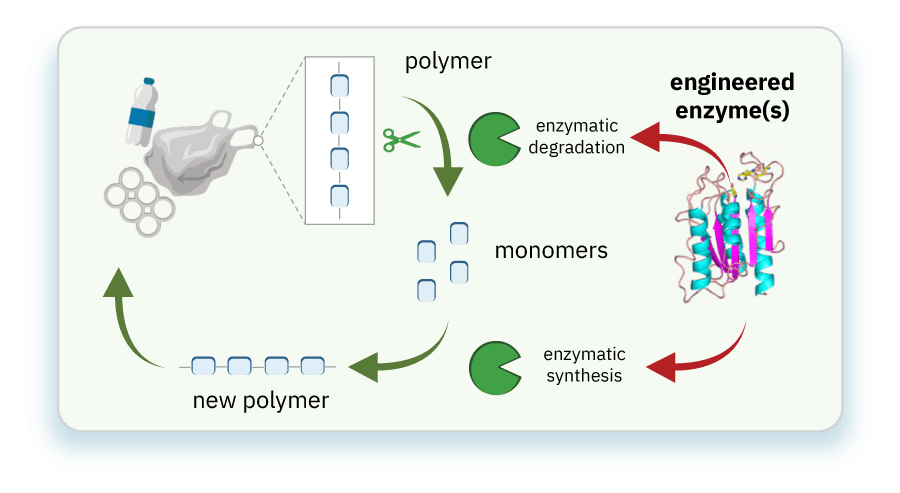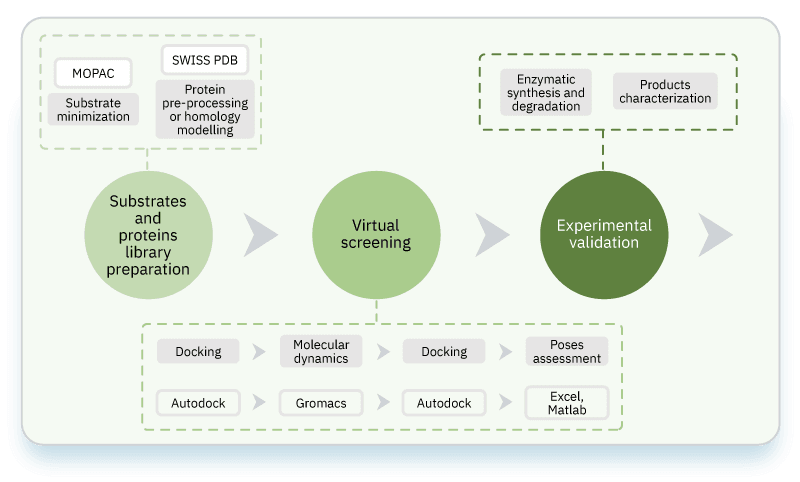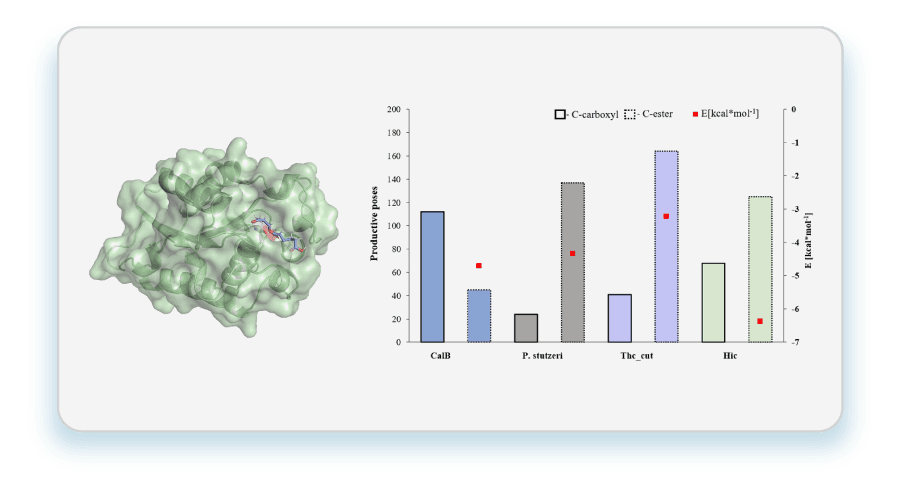Novel approach in green chemistry: automated enzyme screening simulation methods for plastic waste recycling
Written by Anamaria Todea, Demi Vattovaz and Danilo Di Stefano
11 October 2023 · 5 min read

The use of plastics has become indispensable in our everyday lives over the years, but it is now one of the greatest environmental challenges of our time. PlasticEurope - Association of Plastics Manufacturers reports that in 2022, less than 20% of global plastic waste was recycled, despite the fact that more than 390 million tonnes of plastic were produced globally.
Currently, there are two ways to recycle plastics: mechanically and chemically. Mechanical recycling cannot be turned into different types of plastic, and there is a limit to how many times the plastic can be recycled before it deteriorates. Chemical recycling is a process that breaks down plastic at a molecular level which can then be used to create new plastics. It offers a highly effective way to deal with plastic waste and reduce its environmental impact.
In this context, green chemistry is a growing field dedicated to finding innovative and sustainable solutions to the world's environmental challenges such as plastic pollution. In particular, enzymatic degradation has emerged as an innovative and greener alternative to mechanical plastic recycling. It involves the use of enzymes to break down plastic materials into their basic components, making them easier to recycle. This method offers several advantages, including reduced energy consumption and the ability to recycle a wider range of plastics.
Engineered enzymes for plastic recycling purposes
Enzymes are biological catalysts (also known as biocatalysts) that speed up chemical reactions. They have unique properties that allow them to break down various molecules without causing harm to the environment. Unlike traditional chemical methods that often use harsh and toxic substances, enzymatic degradation offers a greener alternative. Enzymatic degradation can be used in the recycling of waste materials, such as plastics. Certain enzymes have the ability to break down plastic polymers, converting them into their original monomers. This allows for easier recycling and reduces the accumulation of plastic waste in landfills and oceans.

Among the most investigated enzymes, we proposed leaf-branch compost cutinase (LCC) for the degradation and synthesis of polyesters and polyamides due to their accessible active site and affinity for solid polymers. The goal of our project was to use protein engineering to modify the natural LCC and obtain an enzyme able to degrade polyamides, which are much more resistant and recalcitrant than polyesters. As a result, the possibility to correlate structural features of a polymer with the catalytic properties of an enzyme would allow us to achieve the rational design of environmentally safe new tailor-made biodegradable polymers. However, the experimental screening of new enzymes is very expensive and time-consuming. For this reason, we used in-silico approaches in order to accelerate the selection of optimal biocatalysts.
Integrated in silico and experimental approaches in an automated simulation workflow
Our approach was to pair a computational investigation to identify hot-spot residues for mutagenesis and experimental studies to assess the stability and activity of the selected mutants (LCC enzymes modified at specific sites). In order to achieve this, we employed modeFRONTIER process automation and design optimization software to integrate different bioinformatics tools into a single simulation workflow to automate in silico design and screening of virtual mutants. Experimental data (activity assays, thermal stability analysis, structural investigation) were used to tune the parameters of the algorithms.

Process flow diagram implemented for in-silico substrates and enzymes screening

Automatic computational procedure for in-silico enzyme screening. From left to right: Substrates and enzymes preparation, docking, molecular dynamics, docking and data analysis
Using modeFRONTIER, we developed an automated pipeline that uses molecular dynamics simulations and docking techniques to identify enzymes with desired features. Molecular docking quickly screens candidate mutants. Then, selected mutants are accurately simulated by molecular dynamics techniques for a more detailed analysis.
At the end of the automatized computational flow, the scoring procedure was accomplished by computing the percentage of productive poses. Large, negative, values of docking free energies are associated with favorable conformations.

Conformation of the dimer containing 1,4-butandiol and adipic acid in the active site of the Hic cutinse with respect to the catalytic Ser 105 (left). Red squares are the average of the docking free energies of the productive poses (right).
modeFRONTIER allowed us to select, from a pool of enzymatic structures, the optimum biocatalyst for catalyzing the synthesis and/or the hydrolysis of polyesters
In summary, this study demonstrated that cutinases are a promising starting point for designing enzymes able to hydrolyze or synthetize bulky polymers because of the accessibility of their active site. Also, the automatic computational simulation workflows driven by modeFRONTIER is a good practice for the fast selection of enzymes that are efficient in catalyzing the hydrolysis and/or synthesis of bio-based polyesters. The results represented a contribution for the rational eco-design of tailored new sustainable polymers and a first step towards the in silico generation and screening of new biocatalysts for the polymer sector.
This project has received funding from the European Union’s Horizon 2020 research and innovation programme under the Marie Skłodowska-Curie grant agreement No 101029444.
Dr Anamaria Todea is postdoctoral researcher at University of Trieste, Department of Chemical and Pharmaceutical Sciences within the Laboratory of Applied and Computational Biocatalysis headed by Prof. Lucia Gardossi. Anamaria acquired the bachelor's degree in Biochemical Engineering, Faculty of Chemistry and Chemical Engineering University “Babes-Bolyai”, Cluj-Napoca, Romania. She acquired the master's degree in Food Chemistry at the Politehnica University of Timişoara, Romania and the PhD in Chemical Engineering at the same university. She carried out research activities in several European universities, such as Delft Technical University (NL), Wageningen University (NL) and Graz Technical University (A). Her scientific interests have been always focused on green chemistry and organic chemistry in general, with specific skills in the biocatalyzed synthesis of polymeric compounds, bioactive and natural molecules. On June 2021 she started as Principal Investigator the European project “Sustainable route for circularity of renewable polyesters” (RenEcoPol) (Marie Curie Individual Fellowship), in which computational methods for the eco-design of renewable polyesters and biodegradable were integrated.
Dr Anamaria Todea is postdoctoral researcher at University of Trieste, Department of Chemical and Pharmaceutical Sciences within the Laboratory of Applied and Computational Biocatalysis headed by Prof. Lucia Gardossi. Anamaria acquired the bachelor's degree in Biochemical Engineering, Faculty of Chemistry and Chemical Engineering University “Babes-Bolyai”, Cluj-Napoca, Romania. She acquired the master's degree in Food Chemistry at the Politehnica University of Timişoara, Romania and the PhD in Chemical Engineering at the same university. She carried out research activities in several European universities, such as Delft Technical University (NL), Wageningen University (NL) and Graz Technical University (A). Her scientific interests have been always focused on green chemistry and organic chemistry in general, with specific skills in the biocatalyzed synthesis of polymeric compounds, bioactive and natural molecules. On June 2021 she started as Principal Investigator the European project “Sustainable route for circularity of renewable polyesters” (RenEcoPol) (Marie Curie Individual Fellowship), in which computational methods for the eco-design of renewable polyesters and biodegradable were integrated.
Demi Vattovaz is a PhD student in Chemistry at the University of Trieste. She holds a Bachelor’s Degree in Biotechnology and a Master’s Degree in Environmental Sciences. Her PhD project is co-funded by ESTECO. Her research is focusing on plastic-degrading enzymes. Her work seeks to harness the power of enzymes to break down plastic materials and mitigate their environmental impact.
Demi Vattovaz is a PhD student in Chemistry at the University of Trieste. She holds a Bachelor’s Degree in Biotechnology and a Master’s Degree in Environmental Sciences. Her PhD project is co-funded by ESTECO. Her research is focusing on plastic-degrading enzymes. Her work seeks to harness the power of enzymes to break down plastic materials and mitigate their environmental impact.
Step-by-step guide into modeFRONTIER - the intuitive vendor agnostic software for process automation and design optimization.
Expedite design process with cutting-edge optimization technology
Step-by-step guide into modeFRONTIER - the intuitive vendor agnostic software for process automation and design optimization.
Expedite design process with cutting-edge optimization technology
Step-by-step guide into modeFRONTIER - the intuitive vendor agnostic software for process automation and design optimization.


